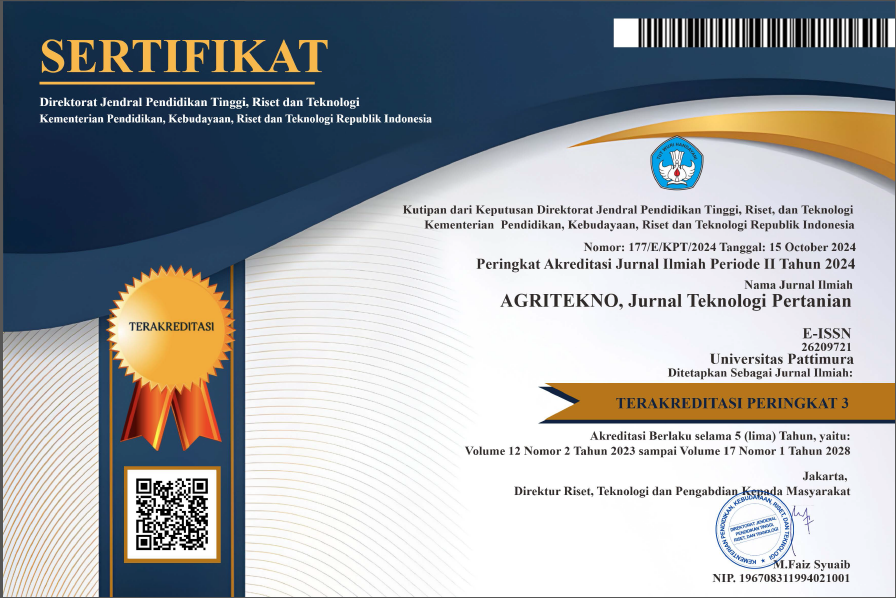ANALISIS PENERAPAN GMP PADA PRODUK KERIPIK UBI JALAR DI KOTA JAYAPURA
Abstract
Crackers industry in Indonesia is mostly home industry or small and medium business enterprises, which produces crackers in a traditional way. Therefore, the quality of the product must be well maintained and meet the requirements as stated in the government regulation N0. 28. 2004 about safety, quality and nutrition of the food. Several small and medium food businesses in Jayapura has still not implement hygiene and sanitation during processing of the product. Thus, the aims of this study were to analyze and to identify the food safety of sweet potato crackers produced by small and medium business in Jayapura city whether it goes in accordance with Indonesia National Standard of Quality; to determine the level of application of Good Manufacturing Practice (GMP) of sweet potato crackers produced by home industries in Jayapura. A descriptive analysis was applied in this research by using an interview and observation to obtain information regarding processing, basic suitability of GMP, also an experimental design was applied to determine the quality of the product. Result showed that there was still limited implementation of GMP among small and medium enterprises. There were 4 home industries that produce sweet potato crackers which did not meet the criteria specified in SNI No 01-4306-1996 due to the positive contamination of the product with Escherichia coli as.
Downloads
References
Badan Pengawas Obat dan Makanan. 2002. Panduan Pengolahan Pangan Yang Baik Bagi IRT. Jakarta.
Badan Pengawas Obat dan Makanan Republik Indonesia. 2009. Peraturan Kepala Badan Pengawas Obat dan Makanan Republik Indonesia, Tentang Penetapan Batasan Maksimum Cemaran Mikroba dan Kimia dalam Makanan No. HK.00.06.1.52.4011.
Badan Standarisasi Nasional Indonesia. 1996. Standarisasi Nasional Indonesia Keripik Ubi Jalar No. 01-4306-1996.
Choirun, M. 2010. Penerapan GMP pada penanganan pasca panen kopi rakyat untuk menurunkan okratoksin produk kopi (Studi Kasus di Sidomulyo, Jember). Jurnal AGROINTEK 4: 114-120.
Damarasri, D.R., S.G. Partiwi, dan J. Gunawan. 2013. Penerapan Good Manufacturing Practice dan Work Improvement in Small Enterprise Pada Usaha Kecil dan Menengah Untuk Pemenuhan Standar Kesehatan (Studi Kasus: UKM Tempe Tenggilis Mejoyo Surabaya). Jurusan Teknik Industri ITS.
Ketaren, S. 2008. Pengantar Teknologi Minyak dan Lemak Pangan. UI Press. Jakarta.
Peraturan Pemerintah RI No. 28 Tahun 2004 tentang Keamanan Mutu dan Gizi Pangan.
Peraturan Menteri Pertanian. 2010. Sistem Jaminan Mutu Pangan Hasil Pertanian. Nomor: 20/Permentan/OT.140/2/2010 Tentang.
Sulistyowati, A. 2004. Membuat Keripik Buah dan Sayur. Puspa Swara. Jakarta.
Syarief, R., Hermanto, dan J. Hariyadi. 1999. Wacana Tempe Indonesia. Universitas Katolik Widya Mandala Press. Surabaya.
Winarno, F.G, dan Surono. 2004. GMP, Cara Pengolahan Pangan yang Baik. Mbrio Press. Bogor.
Zuraida, N. dan Y. Supriati. 2001. Usahatani ubi jalar sebagai bahan pangan alternatif dan diversifikasi sumber karbohidrat. Bulletin Agrobio 4: 13-23.
Authors who publish with this journal agree to the following terms:
- Authors retain copyright and grant the journal the right of first publication with the work simultaneously licensed under a Creative Commons Attribution License that allows others to share the work with an acknowledgement of the work's authorship and initial publication in this journal.
- Authors are able to enter into separate, additional contractual arrangements for the non-exclusive distribution of the journal's published version of the work (e.g., post it to an institutional repository or publish it in a book), with an acknowledgement of its initial publication in this journal.
- Authors are permitted and encouraged to post their work online (e.g., in institutional repositories or on their website) prior to and during the submission process, as it can lead to productive exchanges, as well as earlier and greater citation of published work (See The Effect of Open Access).









